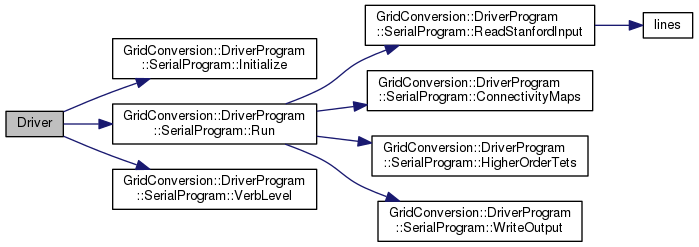Encapsulate GridConversion-specific code constructs. More...
Classes | |
| class | DriverProgramComLine |
| The ComLineObject for the example programs. More... | |
| class | SerialProgram |
| Implementation of the basic parts of the serial program example. More... | |
Typedefs | |
| typedef IRAD::Profiler::ProfilerObj | ProfilerType |
| Convenience type definition for Profiler object. More... | |
| typedef std::string | StackType |
| Convenience type definition for program stack. More... | |
| typedef IRAD::Global::GlobalObj < StackType, int, ProfilerType > | GlobalType |
| Convenience type definition for the serial global object. More... | |
| typedef DriverProgramComLine | ComLineType |
| Convenience type definition for the Main comline object. More... | |
| typedef IRAD::Global::Program < GlobalType, ComLineType > | SerialProgramType |
| Convenience type definition for the serial program. More... | |
| typedef GridConversion::DriverProgram::SerialProgram | SEProgramType |
| Convenience definition for serial program type. More... | |
Functions | |
| template<typename ProgramType > | |
| int | Driver (int argc, char *argv[]) |
| Unified driver for the example programs. More... | |
Encapsulate GridConversion-specific code constructs.
Based off the example program from IRProject For Example Program: This namespace contains all of the base code constructs that are used in the example programs. These example programs have several features which make them very easy to integrate in composite software systems.
Other convenient features of this API are:
| typedef DriverProgramComLine ComLineType |
Convenience type definition for the Main comline object.
Definition at line 134 of file DriverProgram.H.
| typedef IRAD::Global::GlobalObj<StackType,int,ProfilerType> GlobalType |
Convenience type definition for the serial global object.
The global object encapsulates all of the built-in functionalities for a program. Its interface and implementation are defined in IRAD/include/Global.H
Definition at line 56 of file DriverProgram.H.
| typedef IRAD::Profiler::ProfilerObj ProfilerType |
Convenience type definition for Profiler object.
Definition at line 44 of file DriverProgram.H.
Convenience definition for serial program type.
Definition at line 608 of file DriverProgram.H.
Convenience type definition for the serial program.
For a detailed description of the program type, see IRAD::Global::Program documentation.
Definition at line 141 of file DriverProgram.H.
| typedef std::string StackType |
Convenience type definition for program stack.
Definition at line 48 of file DriverProgram.H.
| int GridConversion::DriverProgram::Driver | ( | int | argc, |
| char * | argv[] | ||
| ) |
Unified driver for the example programs.
This driver is exactly the same for both the serial and parallel example programs. It is a direct replacement for main and is responsible for creating the "Program object" and calling its Initialization, Run, and Finalize methods.
Definition at line 572 of file DriverProgram.H.
References SerialProgram::Initialize(), SerialProgram::Run(), and SerialProgram::VerbLevel().
